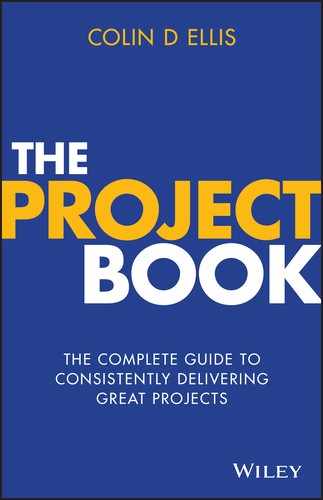CHAPTER 34
START AS YOU MEAN TO GO ON
One role I took involved three interviews. The first was with the recruiting agent to assess my suitability for the organisation in terms of skill set. Next came a first interview with the hiring manager and one of his peers to assess my cultural fit and my attitude towards team building, project management excellence and the like. A third interview, over coffee with the hiring manager and one of the team, focused on some of the specific challenges they were facing and how I would deal with them.
I enjoy interviews, and these were no different. At the end of the third I was confident I would get the work, and I received a positive result the next day. On starting the assignment two weeks later, the hiring manager (my new line manager) wasn’t available owing to meeting commitments. In fact he wasn’t even on site. It took 20 minutes for someone to pick me up from reception. When I got to my desk, nothing had been set up and no instructions had been left for me.
Being full of initiative I worked my way around the office, introducing myself to people, and started making a list based on the conversations we’d had at the interview. After lunch I received a call from my line manager, who told me to read the intranet and complete the compliance ‘exams’, of which there were five, each taking between 30 minutes and an hour. I was also sent the acronym dictionary so I could familiarise myself with the corporate terminology.
What was unusual about this scenario was … well, nothing. It happens time and time again in organisations (and projects) and does nothing to inspire confidence in the new employee, who has been extensively and expensively (in time at least) hired. It’s an immediate demonstration that people aren’t considered as that important, despite everything said at the interview. Excuses will be made (‘I have a governance meeting every Monday that I just can’t get out of’) and pretty soon — within 30 days according to one survey — we’ve decided whether or not it’s an organisation we want to be a part of.
As a project leader it’s your job to make new team members feel part of the team from the very first minute, and this means blocking out (at least) two days to do just that. Talya N. Bauer recommends what she calls the four Cs to successfully integrate new people:
- Compliance. Ensure new hires understand the organisation’s policies and regulations, from health and safety to acceptable internet usage.
- Clarification. Ensure new hires understand their responsibilities and what you expect of them in the next week, month, three months and so on.
- Culture. Give them an overview of the way you do things, what’s acceptable and what’s not. Also use this opportunity to encourage them to add their own ideas through the regular team catch-ups you’ll have.
- Connection. Introduce them to the team and stakeholders, and ensure they know where to go to get information.
At the very minimum you need to set their goals. According to the aforementioned survey, 60 per cent of companies interviewed don’t do this at all. People take project roles to advance their career, to challenge themselves or to be part of something unique. Having taken the time to hire the right person, it’s critical to your culture and continued success that you induct them in the right way. If you don’t, don’t be surprised if they underperform or leave within the first 30 days.
